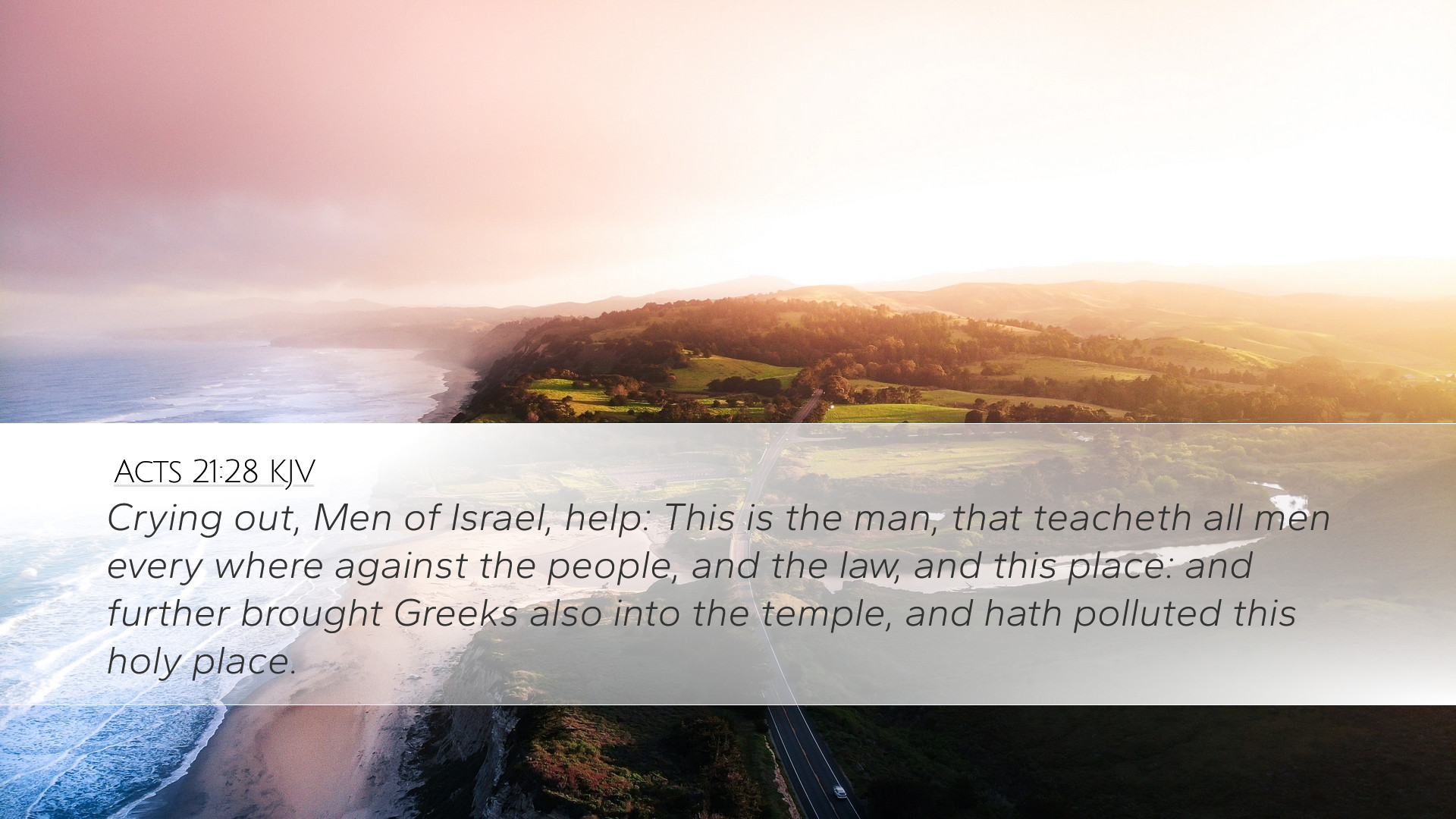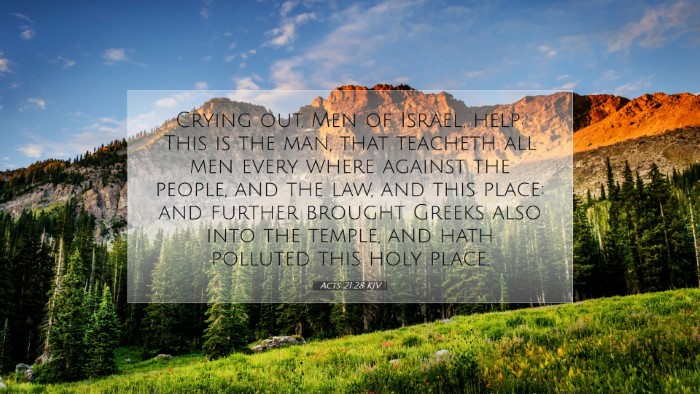Commentary on Acts 21:28
In this verse, we encounter a significant moment in the narrative of the Apostle Paul's journey, specifically emphasizing the tensions present in the early Christian community and the Jewish law. The context of this passage is crucial for understanding both the historical and theological implications. Below is a synthesis of insights from several public domain commentaries, including those by Matthew Henry, Albert Barnes, and Adam Clarke.
Text of Acts 21:28
"Crying out, Men of Israel, help: This is the man that teacheth all men everywhere against the people, and the law, and this place: and further brought Greeks also into the temple, and hath polluted this holy place."
Context and Background
Prior to this verse, Paul had returned to Jerusalem, and his presence stirred considerable tension among the Jews. Paul had been in the company of Gentiles, which became a significant point of contention, as the Jewish authorities accused him of violating the sacred customs and laws of their faith.
The Accusations Explained
Against the People: The accusation of teaching against the Jewish people reflects a deeper conflict between the burgeoning Christian faith and Jewish traditions. Paul, as a former Pharisee, was aware of these cultural and religious sensitivities.
Against the Law: This charge speaks to the broader theological debate regarding the applicability of Jewish law to Gentile converts. Paul’s teachings emphasized faith in Christ over adherence to the law, which stirred hostility among traditionalists.
This Place: The reference to “this place” indicates the temple, central to Jewish worship. The claim that Paul had defiled it reveals the profound fear among the Jews regarding the preservation of their sacred spaces.
Theological Implications
This verse illustrates the friction between Judaism and the emerging Christian faith, a theme prevalent throughout the Book of Acts. The reaction of the Jewish crowd underscores the challenges early Christians faced as they navigated their identity and mission amidst accusations and misunderstandings.
Paul's Mission
Paul's mission involved breaking down barriers, inviting Gentiles into what had previously been considered an exclusively Jewish faith. This was a radical shift that conflicted with long-held beliefs, leading to accusations as seen in Acts 21:28.
Insights from Commentators
Matthew Henry
Henry emphasizes the fervor of the crowd and the serious nature of the charges brought against Paul. He notes that such reactions were not only against Paul personally but against the message of Christianity which sought to fulfill the law rather than abolish it. Henry also highlights the irony that Paul, a man intimately aware of the law, was being accused of transgressing it.
Albert Barnes
Barnes further elucidates the context by pointing to the fear that the Jews felt about their traditions being manipulated and possibly eliminated. He provides a detailed analysis of the implications of 'polluting the holy place', referencing the historical sanctity of the Temple and how the introduction of Gentile practices was perceived as a direct threat to their religious integrity.
Adam Clarke
Clarke explores the depth of the statement regarding the Greeks in the temple, explaining that this act was interpreted as more than just a physical crossing of boundaries; it represented a theological crisis. Clarke suggests that these accusations reflect the deep-seated traditions and cultural barriers that were challenged by the gospel's universal call. He also highlights the frustration of the Jews, acknowledging their efforts to maintain their identity in the face of rapid changes brought on by the spread of Christianity.
Practical Applications
For modern pastors, students, and theologians, this verse serves as a reminder of the challenges faced when a faith tradition begins to evolve. There are timeless lessons on the importance of cultural sensitivity, the need for understanding in the face of accusations, and the imperative of theological clarity when discussing the implications of faith with those rooted in different traditions.
Contemporary Reflections
- Understanding Accusations: As Christians engage with the secular world, they often face misunderstandings about their beliefs. Reflecting on how Paul navigated criticism can provide guidance on how to respond to contemporary accusations.
- Cultural Sensitivity: The importance of recognizing and respecting the cultural contexts of others cannot be overstated in today’s diverse society. Paul's approach in dealing with both Jews and Gentiles can serve as a model.
- Mission and Identity: There is a need for clarity in one's mission and identity within the faith. Believers are called to articulate their understanding of the gospel in ways that resonate across cultural divides.
Conclusion
Acts 21:28 serves as a pivotal moment that encapsulates the struggles of early Christianity. The accusations levied against Paul not only highlight the challenges of his mission but also reflect the broader tensions between tradition and the transformative message of the gospel. As we consider these interpretations, we are reminded of the need for grace, understanding, and patience as we navigate our faith within a diverse world.


